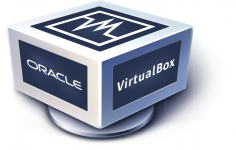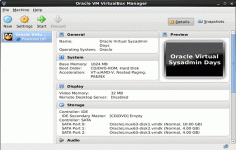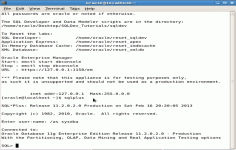 VirtualBox 1.5.6
VirtualBox 1.5.6
Oracle - (Open Source)
VirtualBox is an easy and elegant solution for those who want to control a computer from another computer.
VirtualBox offers virtualize your operating system (OS) guests on a host machine. Called hypervisor, the application supports Windows OS X, Linux, Mac, Solaris, FreeBSD, etc.. as host, Mac OS X missing the call as a guest.
It also includes a remote access via HTTP protocol, convenient for demonstrations on a clean system. The ability to manage multiple states of the system is particularly interesting and its interface is very simple.
Virtualization solutions allow installing an operating system on a virtual machine using the resources of the host PC , thus enjoying very good performance. In the genre, several solutions are known for their ease of use, such as VMware Workstation , Parallels Desktop or Microsoft Virtual PC 2007 SP1.
A virtual machine is a useful way to use two operating systems simultaneously and harmless to the host computer. There is the possibility to install Linux on a virtual machine on Windows and vice versa .
- Title:
- VirtualBox 1.5.6
- File Size:
- 17.1 MB
- Requirements:
- Windows XP
- Language:
- en-us
- License:
- Open Source
- Date Added:
- 19 Feb 2008
- Publisher:
- Oracle
- Homepage:
- http://www.oracle.com
- MD5 Checksum:
- 2C17B62F27861174957C35ACC75CC7E3
* GUI: xed several error messages
* GUI: xed registration dialog crashes once and for all
* GUI: really ask before resetting the VM
* GUI: release mouse and keyboard before the host activates the screensaver
* GUI: xed issue with license display on big screens
* GUI: added setting for network name for internal networks
* GUI: added setting for network device type
* GUI: keyboard xes
* GUI: seamless mode and fullscreen mode xes
* GUI: xed soaked hostkey keyup event under certain conditions
* GUI: more informative message dialog buttons
* GUI: VM selector context menu
* VBoxSDL: added -termacpi switch
* VBoxSDL: xed automatic adaption of the guest screen resolution to the size of the VM window
* VMM: under heavy guest activity, for example when copying les to/from a shared folder, the VM could crash with an assertion
* VMM: added an option to select PIIX4 (improves compatibility with Windows guests created by VMware)
* VMM: xed a bug which could lead to memory corruption under rare circumstances
* VMM: improved performance of Solaris guests
* VRDP: xed a 1.5.4 regression: VRDP client and server were out-of-sync if the VM was started using the GUI
* VRDP: proper error handling if the VRDP library could not be loaded
* VBoxManage: xed crash during clonevdi
* VBoxManage: added list runningvms command
* VBoxManage: improved the compatibility when reading the partition table of a raw disk
* Shared Folders: added support for read-only shared folders
* Shared Clipboard: several xes
* Network: experimental support for E1000 device emulation
* iSCSI: better check for miscongured targets
* iSCSI: allow to directly attach to internal networks with integrated mini IP stack
* PulseAudio: dont hang during VM initialization if no sound server is available
* VDI: xed sized virtual disk images are now completely written during creation to workaround buggy sparse le handling on some OS (e.g. Vista)
* VDI/VMDK: prevent indexing of .vdi and .vmdk les on Windows hosts
* RDP: xed compilation of the Linux rdesktop client on newer Linux kernels
* RDP: install rdesktop-vrdp on Linux hosts
* ACPI: added sleep button event
* Serial: proper handling of inaccessible host devices
* Windows installer: allow smooth upgrade without deinstallation
* Linux installer: xed Slackware detection regression
* Linux installer: updated VBoxTunctl allowing to assign a tap device to a group on Linux kernels > 2.6.23
* Windows additions: several xes, in particular for Windows NT4
* Linux additions: xed installer for Kubuntu 8.04
* Linux additions: add default video mode for handling video mode hints from the host
* Linux host: compatibility xes with Linux > 2.6.24
Related software
0.1/5 from 1120 users


